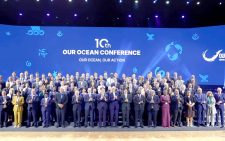EU project offers new lifeline to ‘omena’ dish

Omena traders along Lake Victoria are reaping big after the installation of innovative fast-drying and cooling techniques to preserve the small, nutrient-rich fish commonly consumed in East Africa, particularly in Kenya and Tanzania.
The concept is developed by researchers from Jomo Kenyatta University of Agriculture and Technology (JKUAT) under the leadership of Prof Nelson Ojijo from the Food Science Department and funded by the European Union (EU) through the Forum for Agricultural Research in Africa (FARA). EU gave a team of five from JKUAT research project funding totalling Sh31 million two years ago.
Experts say omena, a vital source of livelihood in the Lake region, faces significant wastage during the long intervals between fishing and drying, thus prompting overfishing to compensate for losses.
The project, initiated in March 2022, has introduced two groundbreaking machines. The first, a portable charcoal-powered cooling device, enables immediate preservation of the fish while the second, a solar-powered drying machine, accelerates the drying process to two hours, preventing microbial growth and significantly improving the quality of the dried Omena.
Implemented at Dunga Beach in Kisumu and Marenga Beach in Busia, the project engages with local beach management units, establishing a crucial link between the project and the fishing communities.
During a recent tour, Nicholas Ouma, Secretary-General of Dunga Beach Management Unit highlighted the positive changes brought about by the project, notably the improved quality of the dried omena. He also emphasised its contribution to women’s empowerment and efficient resource utilisation especially in the rainy season.
“The project’s impact extends beyond preservation, providing practical training sessions for local students. Additionally, these innovations have proven particularly beneficial for the women here at Dunga Beach, reducing loss and freeing up time previously spent chasing birds away from the open-air layouts,” explained Ouma.
He said volumes of omena that went to waste is no longer a problem, adding: “Traders earn more as we plan to work out ways of how we can add value the fish to sell to institutions and super markets.”
The project, coordinated by a consortium of partners comprising FARA, Kenya Marine and Fisheries Research Institute (KEMFRI), the Association for Strengthening Agricultural Research in Eastern and Central Africa, and the Eastern Africa Farmers Federation facilitated training workshops for beach unit members, before the project installation.
The training provided insights on business management skills such as developing business plans to attract private investors in the future and hygienic fish handling fish.
At Marenga Beach, where locals have allocated a section of their land to accommodate the facility, the demand for additional dryers and coolers is high, given that they handle an average of 8,000 kilogrammes of omena, reflecting the success and need for expansion.
Dr Kwaku Antwi, Project Lead from FARA, was pleased with the progress, including the training, noting that while the dryers are insufficient for the biomass, it shows that there is a better way to dry the omena.
He also advised the Beach Management Units to incorporate a cooperative framework, which will provide them with numerous benefits and allow them to take control of their economic future.
Looking ahead, the project aims to add value to Omena through novel products, including snacks and noodles, developed by JKUAT’s Food Science and Technology postgraduate students, promoting fish consumption, especially among the youth with high nutritional demands.
Ojijo says the project is not just transforming the omena industry; it’s creating a sustainable and thriving future for Lake Victoria’s fishing communities because it generates the bulk of the catch in the Lake region. He believes that these innovations will catalyse the much-needed change in the sector.










